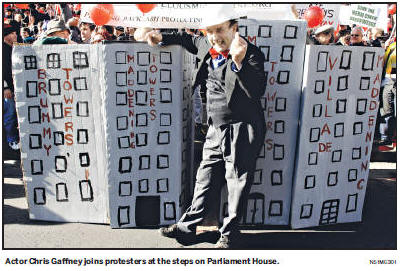
"Dave the Developer" at the Restore Residents' Rights protest rally, June 10, Photo: Progress Leader
Development Assessment Committees' Legislation Stopped In Upper House
Ed. The following story is adapted from the MRRA Macedon Ranges' Residents Association site: It describes a really important battle in the ongoing war for democracy in Victoria which will probably be reported on in other articles at candobetter.
Where to from here?
'Where to from here' depends on whether government finds a way around needing parliament's consent to change the law
The day after the "Restore Residents Rights" rally at parliament house on June 10, which was attended by 600 [1] people, Victoria's upper house rejected changes to the Planning and Environment Act that would have introduced Development Assessment Committees [DACs] to the State.
Initially proposed for a limited number of metropolitan areas, the government's aim is to have this system of decision-making apply more broadly. The DAC system takes planning powers off Councils and hands them to majority government-appointed committees which then make planning decisions in Council's place, while Councils and community carry the financial costs of having DACs make the decisions for them.
Lack of transparency key concern for democracy
Key concerns with DACs include a lack of clarity about accountability and transparency mechanisms, the breach of fundamental democratic principles and the community's right to know, and the potential for planning decisions to be driven by party politics, and implementing specific development agendas without any obvious ability by the community to express their views to the decision-makers.
In their present proposed form, DACs are vulnerable to being 'stacked' politically, while cutting off Councils and communities from decisions that affect them. Another concern is the inadequacy of the current planning system to produce outcomes that the community, as opposed to the developer, wants.
DAC Ideology
The whole DACs ideology captures and builds on a belief held at governmental level that all it takes to make a "good" planning decision is some 'tick boxes' and for applicants and decision-makers to settle it between themselves - no such thing as "no", just "whatever it takes". You get to know about it when it happens. So much for community ownership of decisions that affect the community! And they wonder why we are all getting peed off!
As "Dave The Developer" said at the RRR rally, this a fantastic government - when us developers go in with 12 storeys in a 5 storey area, all they say is, is 12 enough?!!
Chris Gaffney played the part of Dave the Developer and put on a great comedy act. The whole show was the idea of the Darebin Appropriate Development Association and they had working bees to make the little houses and garden that were knocked over by the Bobcat. In the photo you see the splendid high rise blocks called Brumby Towers and Villa de Maddening that rose in their place.
[1] A reestimation based on the known number of people carrying balloons (300) plus the number of people not carrying balloons, puts the total around 600 people, which is huge for the sprawling, socially disorganised and transport-disconnected city of Melbourne, where, although population is growing, democracy and communication are shrinking.

Comments
syed saiful alam (not verified)
Tue, 2009-09-22 23:45
Permalink
Saving the planet one step at a time
Have you heard of climate change?
Temperatures are getting higher. Storms are getting worse. Ice is melting and sea levels are rising. Portions of the coast of Bangladesh are likely to go underwater, lost forever. Millions will become homeless. The ability of the earth to sustain people is threatened.
Why is climate change happening?
Because people are burning up fossil fuels (diesel, petrol, natural gas, coal) at such rapid rates that future generations are now threatened.
Is it possible to slow climate change?
Yes, but we cannot continue to waste time. Carbon dioxide levels are rising rapidly. That is where the number 350 comes in. If we can limit CO2 in the atmosphere to 350 parts per million then we can avoid the worst of the harm to come.
Is there anything we can do?
No one person can stop climate change but everyone contributes something significant. We can slow out own use of fossil fuels by walking and cycling and taking cycle rickshaws rather than using motorized transport. We can reduce our use of electricity. We can avoid, as a nation, burning coal (pure carbon) or selling it to others to burn. We can encourage the government to act to encourage reductions in fuel use and to encourage walking, cycling, and rickshaws.
This will mean making some changes. Fortunately, most of those changes are likely to increase rather than reduce our quality of life. Imagine being able to cycle safely in Dhaka. Imagine the air being fresh and clean. Imagine children and youth being able to play in side streets. If we move our focus from cars to people, from travelling long distances to accessing basic needs close to home, we can reduce congestion and all the misery it causes, We can have more time with family and for the other important parts of life.
Remember 350 is not just a number. It is not just an ideal. It is something we can all work to make a reality
Originally published on dhaka-rickshaw.blogspot.com.
Add comment